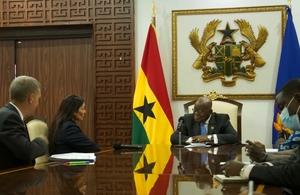UK Government appoints Special Envoy to the US on Northern Ireland
The Secretary of State for Northern Ireland, Brandon Lewis MP has today announced the appointment of a Special Envoy to the United States on Northern Ireland.
Trevor Ringland MBE will be the first Special Envoy to the United States on Northern Ireland and will be responsible for promoting Northern Ireland interests across the US – in the Administration, Congress and within the Irish American community.
The creation of this new post reflects the UK Government’s enduring commitment to the peace, prosperity and stability of Northern Ireland. It will support the Government’s vision for Northern Ireland, built on its promotion as an excellent place to live, work and do business.
Through this new appointment the Government will seek to foster greater dialogue with key US stakeholders on the causes that matter to Northern Ireland and its people, drive inward investment into Northern Ireland and build on the ongoing partnership between the UK and US, which remains vital to safeguarding Northern Ireland’s stability and prosperity.
As Special Envoy, Mr Ringland will also be tasked to work with US firms and investors with an interest in Northern Ireland to build on established links and support Northern Ireland’s long term economic development.
Mr Ringland is a solicitor, former Rugby international and committed community activist. He will draw on his extensive knowledge of Northern Ireland’s society and political context to support his work in the role, utilising his connections across civic society and the private sector.
He will report to the Secretary of State for Northern Ireland and the Prime Minister.
Welcoming Mr Ringland’s appointment, Secretary of State for Northern Ireland, Brandon Lewis MP, said:
“I am delighted that Trevor has accepted my invitation to take up this position to represent the UK Government in Northern Ireland, working to support its best interests in the United States.
“This is an exciting new appointment and recognises Northern Ireland’s unique relationship with the United States and its people. I look forward to working with Trevor to harness all the opportunities that lie ahead.”
Mr Ringland said:
“I am honoured to take up this role on behalf of the UK Government. I very much look forward to supporting the Secretary of State for Northern Ireland in ensuring the UK Government’s policies on Northern Ireland are well represented to US audiences and playing my part in forging deeper political, social and economic ties between our two countries.”
Notes to Editors
-
Trevor Maxwell Ringland MBE is a solicitor and former rugby player.
-
Mr Ringland is a full-time solicitor for Macaulay and Ritchie. He is also active with the PeacePlayers International, an organisation devoted to promoting inter-religious unity in Belfast through sport.
-
In rugby, Mr Ringland made 31 competitive appearances for Ireland. He also represented Ulster and Ballymena.
-
In 1983, he toured New Zealand with the British and Irish Lions. Since retirement he has coached at Ballymena and been a committee member of the Irish Rugby Football Union.
-
Mr Ringland was awarded an MBE for services to the community in Northern Ireland in the New Year Honours 2009.
-
This is an unsalaried position – however, an allowance will be provided to cover necessary expenses.
